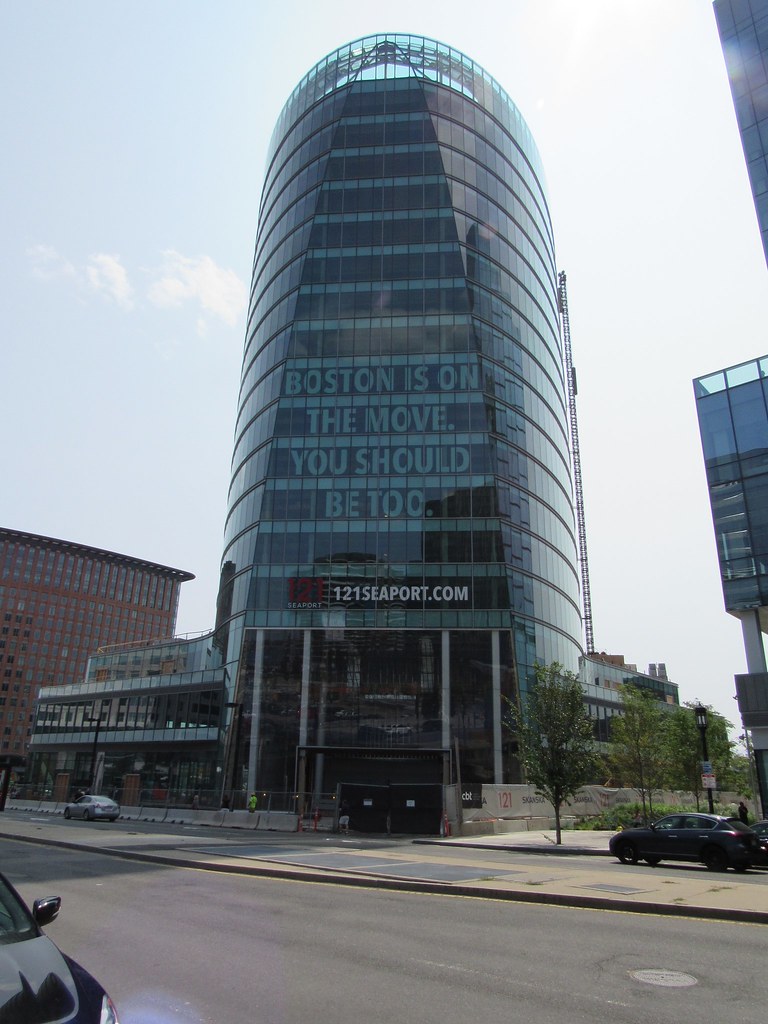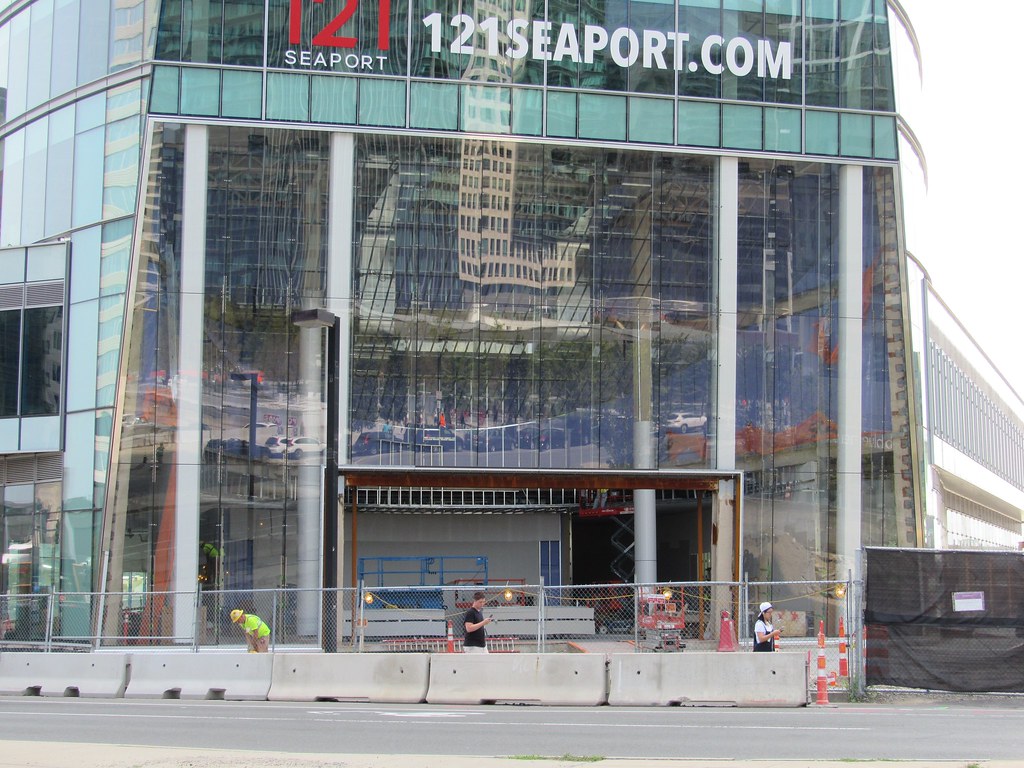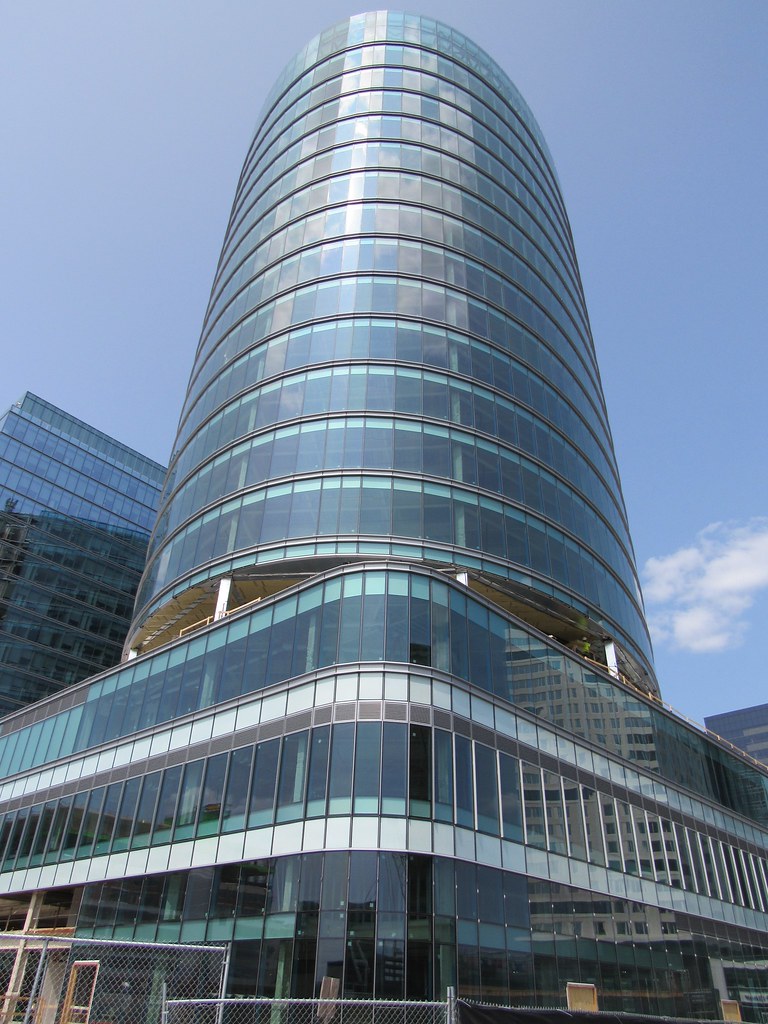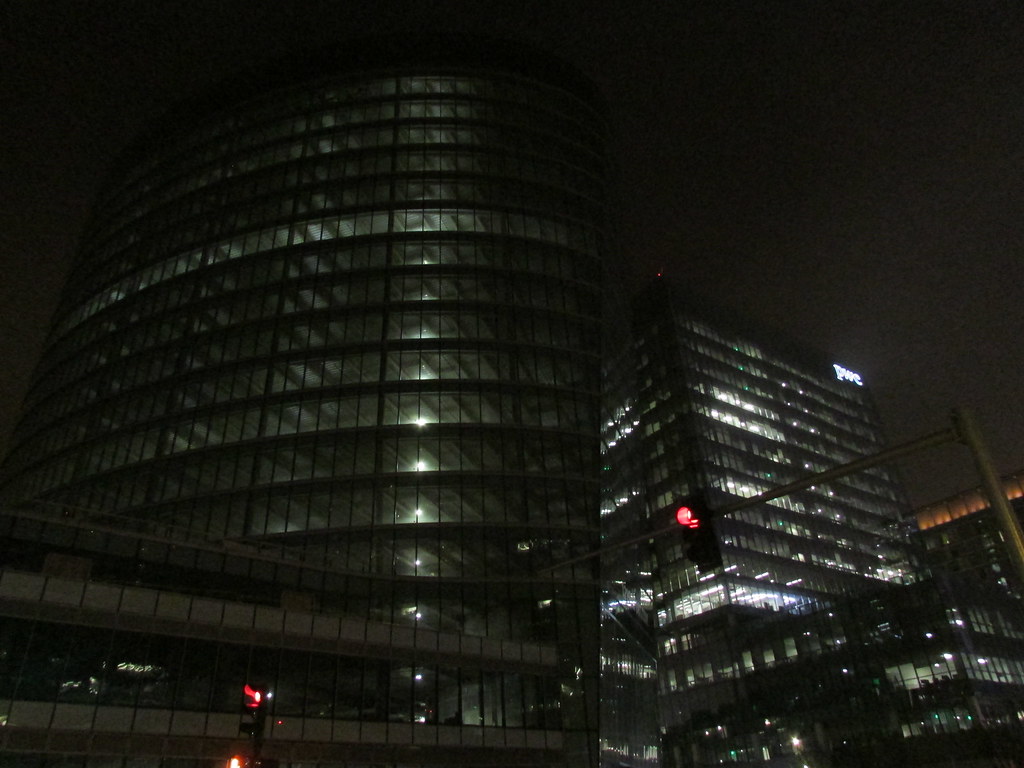You are using an out of date browser. It may not display this or other websites correctly.
You should upgrade or use an alternative browser.
You should upgrade or use an alternative browser.
121 Seaport Boulevard | Parcel L2 | Seaport Square
- Thread starter Rick
- Start date
This building would stand out a lot more if the glass wasn't the same color as so many other new seaport buildings. Welcome to Waltham on the Water!
I agree 1000%.
Continuing to beat this dead horse.
This is the next project for Skanska at 121 Seaport Blvd which is the next block south of the 101 Seaport Blvd tower project. At least no one can say it's a glass box.



atlantaden
Senior Member
- Joined
- May 31, 2006
- Messages
- 2,603
- Reaction score
- 2,731
Since I'm all about glass, I'm all about this building, more so due to the curvy design, front lobby downwards slash, and the surrounding retail spaces on both sides. I do believe in a few years when the M parcels are finished with all it's different claddings and window placements, 121 will be a standout, even more so than she is now.
odurandina
Senior Member
- Joined
- Dec 1, 2015
- Messages
- 5,328
- Reaction score
- 265
nice curved desktop computer box.
JohnAKeith
Senior Member
- Joined
- Dec 24, 2008
- Messages
- 4,337
- Reaction score
- 82
Not sure who's going there but (rather obviously) it was offered up to Aetna when they were looking for their new headquarters (before they chose NY).
Poolio
Active Member
- Joined
- Jan 8, 2014
- Messages
- 364
- Reaction score
- 1,421
I'm really liking the glass mechanical screen. Love the transparency. It doesn't try to hide anything but still provides a nice clean line. Most importantly it belongs there and is consistent with the rest of the building. This is the same approach they took with Lovejoy Wharf, and it worked there brilliantly. So much better than the travesties we see at the Pierce, 22 Liberty, and elsewhere.
- Joined
- Jan 7, 2012
- Messages
- 14,062
- Reaction score
- 22,726
PTC is moving in. 250k square feet in the top half of the building with 1000 employees. PTC works with Internet of Things products, a market GE has been trying to enter recently.
bigpicture7
Senior Member
- Joined
- May 5, 2016
- Messages
- 3,895
- Reaction score
- 9,513
PTC also makes various cad software, analysis, and math software.
Funny how "PTC" and "PWC" signs will be next to each other on the seaport skyline.
This is good news. Solid tenant.
Funny how "PTC" and "PWC" signs will be next to each other on the seaport skyline.
This is good news. Solid tenant.
BostonDrew
Active Member
- Joined
- Mar 2, 2014
- Messages
- 487
- Reaction score
- 0
I wonder if their "Corporate Experience Center" would be open to the public.
Czervik.Construction
Senior Member
- Joined
- Apr 15, 2013
- Messages
- 1,932
- Reaction score
- 1,162
This is really cool to see a large Route 128 tech company move the entire show into the city. I bet the landlord in Needham will have fun trying to lease all that space.
Used to work for PTC as an engineer. Was talking with some of my former coworkers who are still there and they think this is a downsizing plan in disguise. Knowing the culture and demographic of the companies workforce currently at the Needham office I am inclined to agree. These people are going to hate commuting into downtown Boston.
Much of the "new" PTC which has emerged in the last four years or so has come from acquisition and works remote rather than at the Needham office.
Much of the "new" PTC which has emerged in the last four years or so has come from acquisition and works remote rather than at the Needham office.
dshoost88
Senior Member
- Joined
- Apr 14, 2008
- Messages
- 2,167
- Reaction score
- 2,589
FYI, Alexion is confirmed to be moving to 150,000 sq. ft. at 121 Seaport Blvd. Between Alexion and PTC last week, 121 Seaport is 100% leased.
Amazing week for Skanska, and this is excellent news for upcoming office developments around the city as the vacancy rate tightens.
Amazing week for Skanska, and this is excellent news for upcoming office developments around the city as the vacancy rate tightens.
FYI, Alexion is confirmed to be moving to 150,000 sq. ft. at 121 Seaport Blvd. Between Alexion and PTC last week, 121 Seaport is 100% leased.
Amazing week for Skanska, and this is excellent news for upcoming office developments around the city as the vacancy rate tightens.
That is great news. It's interesting. In my admittedly limited observations, it seems that most Class A office space that is built on speculation seems to get filled up, while those that wait for tenants (e.g., One Congress, Hub on Causeway, etc.) seem to gather dust. Perhaps it's still too early for either of my two cited examples. My assumption is that most companies that intend to move to the city or scale up their operations don't have time for these developments to come to fruition. Would others agree? If so, why aren't more developers willing to commit to constructing these buildings, particularly when vacancy rates are low.
I'm sure I'll get raked over the coals or ignored for posting this question in this thread. I'm also sure that it's a question that's been posed "a billion times." I'm lazy.
dshoost88
Senior Member
- Joined
- Apr 14, 2008
- Messages
- 2,167
- Reaction score
- 2,589
That is great news. It's interesting. In my admittedly limited observations, it seems that most Class A office space that is built on speculation seems to get filled up, while those that wait for tenants (e.g., One Congress, Hub on Causeway, etc.) seem to gather dust. Perhaps it's still too early for either of my two cited examples. My assumption is that most companies that intend to move to the city or scale up their operations don't have time for these developments to come to fruition. Would others agree? If so, why aren't more developers willing to commit to constructing these buildings, particularly when vacancy rates are low.
I'm sure I'll get raked over the coals or ignored for posting this question in this thread. I'm also sure that it's a question that's been posed "a billion times." I'm lazy.
It's a good question. And there's a simple, one-word answer:
Risk.
(but here's a longer answer)
Boston admittedly has exceptionally healthy occupancy rates across all land use types (residential, retail, office, hotel, etc.)... it's one of the reasons the value of real estate costs so much here. And the city's done a noteworthy job diversifying its industrial base, especially since the mini recession following the dot-com bust (which had hurt the whole state worse than other parts of the country).
While a developer may have a solid grasp of where the demand lays throughout the city and for which uses, their obstacle is to secure financing. And financiers need the hard evidence (numbers) to demonstrate they'll see a return on their investment before they're willing to shell out the money to develop a project. For years, luxury rentals were a no-brainer to finance in Boston because new luxury buildings would reach 90% occupancy within a year of opening--which is fantastic! As the inventory of those units has added up, there's still demand for them, but we're starting to see their value cool a little bit (ex. see Samuels & Associates plan change from residential to office space at Landmark Center).
121 Seaport is such a rare, fantasy, exceptional scenario in the development world: Skanska both developed and self-financed the project; and miraculously secured not only one, but TWO corporate global HQ relocations. A project like this office tower costs in the ballpark of $100M to $200M (maybe half or a 3rd of what Hub on Causeway and One Congress will come out to)... still incredibly expensive, and thus risky. Skanska had the advantage of large enough capital reserves to invest in this themselves and assume all the risk--most developers' instincts are to spread risk among other stakeholders (i.e. investors).
I think the preference of companies looking to relocate or expand office space in a short- or long- timeframe is honestly all across the map. Companies have longer lease terms (usually 10+ years), and can reevaluate their needs for space somewhere around the 7 or 8-year mark of those leases. Usually the large firms have 18 months or more to prepare for a relocation, which is similar to the duration of time it takes to construct a new office building. And developers of office buildings really only want a firm commitment for a fraction of the space that they're trying to lease in order to secure financing (like a company signing a long-term lease for 30% of the project's square footage)... the city's only new office tower during the recession--Boston Properties' Atlantic Wharf--only came to fruition because Wellington Management pre-leased 40% of the space in that building.
Like I shared in my initial post, the absorption of any vacant office space in the city is good news for all approved, shovel-ready office tower projects. As available space tightens, companies looking to expand/relocate in Boston will negotiate the deals that keep development momentum rolling.
JumboBuc
Senior Member
- Joined
- Jun 26, 2013
- Messages
- 2,659
- Reaction score
- 1,558
Skanska has been making an absolute killing in Boston lately.
They bought their Seaport parcel for $88 million just five years ago. Since then, they've built Watermark Seaport, which is healthily leased at high rents; 101 Seaport, which they sold to office portion of for $452 million ($1030/sf) shortly after opening; and 121 Seaport, which they built on spec but still managed to fully lease before opening. Dshoot is right, they took a risk and it paid off big time. And by self-financing, they were able to make it work. Plus they've had successful projects in Cambridge, and are looking like they'll be successful with The Harlo too.
The importance of financing cannot be understated when thinking about building on spec vs. pre-leasing. Pre-recession we (as a country) used to build a lot more on spec. After the recession, lenders are skittish. 121 Seaport, I believe, is Boston's first spec building since One Marina Park Drive. This project has shown that building on spec can work very well, but you've still gotta find investors willing to take the plunge.
It may seem that buildings that wait for financing "gather dust", but that's largely because the ones that gather dust are the ones we remember. The ones that don't gather dust (PwC, Goodwin Proctor, Pier 4 office, most of the stuff in Kendall, etc.) we tend not to think about as much. Nearly all of the office buildings built in the last 10 years have been pre-leased, yet they've still all gotten built!
Regarding spec vs. pre-leased, one detail on Hub on Causeway: Phase I of that project, which is well underway, includes 175k sf of office. That's not insignificant! Phase III is 525k sf of office. Since Phase I is the the podium, it will include all the prep and foundation work for Phase III. So once Phases I and II are done, Phase III should be pretty easy for BXP to put up. If anything, I'd guess that Hub on Causeway Phase III will be a cheaper project than 121 Seaport was. It's not in the same boat as a project like One Congress, which is a 100% new tower with all the costs that entails.
They bought their Seaport parcel for $88 million just five years ago. Since then, they've built Watermark Seaport, which is healthily leased at high rents; 101 Seaport, which they sold to office portion of for $452 million ($1030/sf) shortly after opening; and 121 Seaport, which they built on spec but still managed to fully lease before opening. Dshoot is right, they took a risk and it paid off big time. And by self-financing, they were able to make it work. Plus they've had successful projects in Cambridge, and are looking like they'll be successful with The Harlo too.
The importance of financing cannot be understated when thinking about building on spec vs. pre-leasing. Pre-recession we (as a country) used to build a lot more on spec. After the recession, lenders are skittish. 121 Seaport, I believe, is Boston's first spec building since One Marina Park Drive. This project has shown that building on spec can work very well, but you've still gotta find investors willing to take the plunge.
It may seem that buildings that wait for financing "gather dust", but that's largely because the ones that gather dust are the ones we remember. The ones that don't gather dust (PwC, Goodwin Proctor, Pier 4 office, most of the stuff in Kendall, etc.) we tend not to think about as much. Nearly all of the office buildings built in the last 10 years have been pre-leased, yet they've still all gotten built!
Regarding spec vs. pre-leased, one detail on Hub on Causeway: Phase I of that project, which is well underway, includes 175k sf of office. That's not insignificant! Phase III is 525k sf of office. Since Phase I is the the podium, it will include all the prep and foundation work for Phase III. So once Phases I and II are done, Phase III should be pretty easy for BXP to put up. If anything, I'd guess that Hub on Causeway Phase III will be a cheaper project than 121 Seaport was. It's not in the same boat as a project like One Congress, which is a 100% new tower with all the costs that entails.
It's a good question. And there's a simple, one-word answer:
Risk.
(but here's a longer answer)
Boston admittedly has exceptionally healthy occupancy rates across all land use types (residential, retail, office, hotel, etc.)... it's one of the reasons the value of real estate costs so much here. And the city's done a noteworthy job diversifying its industrial base, especially since the mini recession following the dot-com bust (which had hurt the whole state worse than other parts of the country).
While a developer may have a solid grasp of where the demand lays throughout the city and for which uses, their obstacle is to secure financing. And financiers need the hard evidence (numbers) to demonstrate they'll see a return on their investment before they're willing to shell out the money to develop a project. For years, luxury rentals were a no-brainer to finance in Boston because new luxury buildings would reach 90% occupancy within a year of opening--which is fantastic! As the inventory of those units has added up, there's still demand for them, but we're starting to see their value cool a little bit (ex. see Samuels & Associates plan change from residential to office space at Landmark Center).
121 Seaport is such a rare, fantasy, exceptional scenario in the development world: Skanska both developed and self-financed the project; and miraculously secured not only one, but TWO corporate global HQ relocations. A project like this office tower costs in the ballpark of $100M to $200M (maybe half or a 3rd of what Hub on Causeway and One Congress will come out to)... still incredibly expensive, and thus risky. Skanska had the advantage of large enough capital reserves to invest in this themselves and assume all the risk--most developers' instincts are to spread risk among other stakeholders (i.e. investors).
I think the preference of companies looking to relocate or expand office space in a short- or long- timeframe is honestly all across the map. Companies have longer lease terms (usually 10+ years), and can reevaluate their needs for space somewhere around the 7 or 8-year mark of those leases. Usually the large firms have 18 months or more to prepare for a relocation, which is similar to the duration of time it takes to construct a new office building. And developers of office buildings really only want a firm commitment for a fraction of the space that they're trying to lease in order to secure financing (like a company signing a long-term lease for 30% of the project's square footage)... the city's only new office tower during the recession--Boston Properties' Atlantic Wharf--only came to fruition because Wellington Management pre-leased 40% of the space in that building.
Like I shared in my initial post, the absorption of any vacant office space in the city is good news for all approved, shovel-ready office tower projects. As available space tightens, companies looking to expand/relocate in Boston will negotiate the deals that keep development momentum rolling.
Outstanding post.





